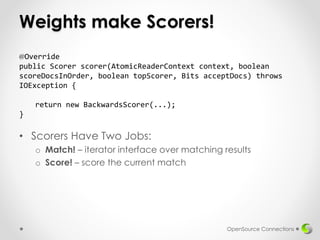Hacking Lucene for Custom Search Results
- 1. Hacking Lucene for Custom Search Results Doug Turnbull OpenSource Connections OpenSource Connections
- 2. Hello Me @softwaredoug [email protected] Us OpenSource Connections @o19s http://o19s.com - Trusted Advisors in Search, Discovery & Analytics OpenSource Connections
- 3. Related Resources • Code for this talk can be found here: o https://github.com/o19s/lucene-query-example • Blog Articles: o Build Your Own Custom Lucene Query and Scorer: http://www.opensourceconnections.com/2014/01 /20/build-your-own-custom-lucene-query-and- scorer/ o Using Custom Score Query for Custom Solr/Lucene Scoring: http://www.opensourceconnections.com/2014/03 /12/using-customscorequery-for-custom- solrlucene-scoring/ OpenSource Connections
- 4. Tough Search Problems • We have demanding users! OpenSource Connections Switch these two!
- 5. Tough Search Problems • Demanding users! OpenSource Connections WRONG! Make search do what is in my head!
- 6. Tough Search Problems • Our Eternal Problem: o Customers don’t care about the technology field of Information Retrieval: they just want results o BUT we are constrained by the tech! OpenSource Connections This is how a search engine works! In one ear Out the other /dev/null
- 7. Satisfying User Expectations • Easy: The Search Relevancy Game: o Solr query operations (boosts, etc) o Analysis of query/index to enhance matching • Medium: Forget this, lets write some Java o Solr query parsers. Reuse existing Lucene Queries to get closer to user needs OpenSource Connections
- 8. That Still Didn’t Work • Look at him, he’s angrier than ever! • For the toughest problems, we’ve made search complex and brittle • WHACK-A-MOLE: o Fix one problem, cause another o We give up, OpenSource Connections
- 9. Next Level • Hard: Custom Lucene Scoring – implement a query and scorer to explicitly control matching and scoring OpenSource Connections This is the Nuclear Option!
- 10. Shameless Plug • How do we know if we’re making progress? OpenSource Connections • Quepid! – our search test driven workbench o http://quepid.com
- 11. Lucene Lets Review • At some point we wrote a Lucene index to a directory • Boilerplate (open up the index): OpenSource Connections Directory d = new RAMDirectory(); IndexReader ir = DirectoryReader.open(d); IndexSearcher is = new IndexSearcher(ir); Boilerplate setup of: • Directory Lucene’s handle to the FS • IndexReader – Access to Lucene’s data structures • IndexSearcher – use index searcher to perform search
- 12. Lucene Lets Review • Queries: • Queries That Combine Queries OpenSource Connections Make a Query and Search! • TermQuery: basic term search for a field Term termToFind = new Term("tag", "space"); TermQuery spaceQ = new TermQuery(termToFind); termToFind = new Term("tag", "star-trek"); TermQuery starTrekQ = new TermQuery(termToFind); BooleanQuery bq = new BooleanQuery(); BooleanClause bClause = new BooleanClause(spaceQ, Occur.MUST); BooleanClause bClause2 = new BooleanClause(starTrekQ, Occur.SHOULD); bq.add(bClause); bq.add(bClause2);
- 13. Lucene Lets Review • Query responsible for specifying search behavior • Both: o Matching – what documents to include in the results o Scoring – how relevant is a result to the query by assigning a score OpenSource Connections
- 14. Lucene Queries, 30,000 ft view OpenSource Connections LuceneQuery IndexReader Find next Match IndexSearcher Aka, “not really accurate, but what to tell your boss to not confuse them” Next Match Plz Here ya go Score That Plz Calc. score Score of last doc
- 15. First Stop CustomScoreQuery • Wrap a query but override its score OpenSource Connections CustomScoreQuery LuceneQuery Find next Match Calc. score CustomScoreProvider Rescore doc New Score Next Match Plz Here ya go Score That Plz Score of last doc Result: - Matching Behavior unchanged - Scoring completely overriden A chance to reorder results of a Lucene Query by tweaking scoring
- 16. How to use? • Use a normal Lucene query for matching Term t = new Term("tag", "star-trek"); TermQuery tq = new TermQuery(t); • Create & Use a CustomQueryScorer for scoring that wraps the Lucene query CountingQuery ct = new CountingQuery(tq); OpenSource Connections
- 17. Implementation • Extend CustomScoreQuery, provide a CustomScoreProvider OpenSource Connections protected CustomScoreProvider getCustomScoreProvider( AtomicReaderContext context) throws IOException { return new CountingQueryScoreProvider("tag", context); } (boilerplate omitted)
- 18. Implementation • CustomScoreProvider rescores each doc with IndexReader & docId OpenSource Connections // Give all docs a score of 1.0 public float customScore(int doc, float subQueryScore, float valSrcScores[]) throws IOException { return (float)(1.0f); // New Score }
- 19. Implementation • Example: Sort by number of terms in a field OpenSource Connections // Rescores by counting the number of terms in the field public float customScore(int doc, float subQueryScore, float valSrcScores[]) throws IOException { IndexReader r = context.reader(); Terms tv = r.getTermVector(doc, _field); TermsEnum termsEnum = null; termsEnum = tv.iterator(termsEnum); int numTerms = 0; while((termsEnum.next()) != null) { numTerms++; } return (float)(numTerms); // New Score }
- 20. CustomScoreQuery, Takeaway • SIMPLE! o Relatively few gotchas or bells & whistles (we will see lots of gotchas) • Limited o No tight control on what matches • If this satisfies your requirements: You should get off the train here OpenSource Connections
- 21. Lucene Circle Back • I care about overriding scoring o CustomScoreQuery • I need to control custom scoring and matching o Custom Lucene Queries! OpenSource Connections
- 22. Example – Backwards Query • Search for terms backwards! o Instead of banana, lets create a query that finds ananab matches and scores the document (5.0) o But lets also match forward terms (banana), but with a lower score (1.0) • Disclaimer: its probably possible to do this with easier means! https://github.com/o19s/lucene-query-example/ OpenSource Connections
- 23. Lucene Queries, 30,000 ft view OpenSource Connections LuceneQuery IndexReader Find next Match IndexSearcher Aka, “not really accurate, but what to tell your boss to not confuse them” Next Match Plz Here ya go Score That Plz Calc. score Score of last doc
- 24. Anatomy of Lucene Query OpenSource Connections LuceneQuery Weight Scorer A Tale Of Three Classes: • Queries Create Weights: • Query-level stats for this search • Think “IDF” when you hear weights • Weights Create Scorers: • Heavy Lifting, reports matches and returns a score Weight & Scorer are inner classes of Query Next Match Plz Here ya go Score That Plz Score of last doc Find next Match Calc. score
- 25. Backwards Query Outline OpenSource Connections class BacwkardsQuery { class BackwardsScorer { // matching & scoring functionality } class BackwardsWeight { // query normalization and other “global” stats public Scorer scorer(AtomicReaderContext context, …) } public Weight createWeight(IndexSearcher) }
- 26. How are these used? OpenSource Connections Query q = new BackwardsQuery(); idxSearcher.search(q); This Setup Happens: When you do: Weight w = q.createWeight(idxSearcher); normalize(w); foreach IndexReader idxReader: Scorer s = w.scorer(idxReader); Important to know how Lucene is calling your code
- 27. Weight OpenSource Connections Weight w = q.createWeight(idxSearcher); normalize(w); What should we do with our weight? IndexSearcher Level Stats - Notice we pass the IndexSearcher when we create the weight - Weight tracks IndexSearcher level statistics used for scoring Query Normalization - Weight also participates in query normalization Remember – its your Weight! Weight can be a no-op and just create searchers
- 28. Weight & Query Normalization OpenSource Connections Query Normalization – an optional little ritual to take your Weight instance through: float v = weight.getValueForNormalization(); float norm = getSimilarity().queryNorm(v); weight.normalize(norm, 1.0f); What I think my weight is Normalize that weight against global statistics Pass back the normalized stats
- 29. Weight & Query Normalization • For TermQuery: o The result of all this ceremony is the IDF (inverse document frequency of the term). • This code is fairly abstract o All three steps are pluggable, and can be totally ignored OpenSource Connections float v = weight.getValueForNormalization(); float norm = getSimilarity().queryNorm(v); weight.normalize(norm, 1.0f);
- 30. BackwardsWeight • Custom Weight that completely ignores query normalization: OpenSource Connections @Override public float getValueForNormalization() throws IOException { return 0.0f; } @Override public void normalize(float norm, float topLevelBoost) { // no-op }
- 31. Weights make Scorers! • Scorers Have Two Jobs: o Match! – iterator interface over matching results o Score! – score the current match OpenSource Connections @Override public Scorer scorer(AtomicReaderContext context, boolean scoreDocsInOrder, boolean topScorer, Bits acceptDocs) throws IOException { return new BackwardsScorer(...); }
- 32. Scorer as an iterator Inherits the following from DocsEnum: • nextDoc() o Next match • advance(int docId) – o Seek to the specified docId • docID() o Id of the current document we’re on Oh and, from Scorer • score() o Score the current docID() OpenSource Connections DocsEnum Scorer DocIdSetIterator
- 33. In other words… • Remember THIS? OpenSource Connections LuceneQuery IndexReader Find next Match IndexSearcher Next Match Plz Here ya go Score That Plz Calc. score Score of curr doc LuceneQueryLuceneScorer …Actually… nextDoc() score() Scorer == Engine of the Query
- 34. What would nextDoc look like • Remember search is an inverted index o Much like a book index o Fields -> Terms -> Documents! OpenSource Connections IndexReader == our handle to inverted index: • Much like an index. Given term, return list of doc ids • TermsEnum: • Enumeration of terms (actual logical index of terms) • DocsEnum • Enum. of corresponding docIDs (like list of pages next to term)
- 35. What would nextDoc look like? OpenSource Connections IndexReader Find next Match Calc. score LuceneScorerfinal TermsEnum termsEnum = reader.terms(term.field()).iterator(null); termsEnum.seekExact(term.bytes(), state); • TermsEnum to lookup info for a Term: DocsEnum docs = termsEnum.docs(acceptDocs, null); • Each term has a DocsEnum that lists the docs that contain this term:
- 36. What would nextDoc look like? OpenSource Connections IndexReader Find next Match Calc. score LuceneScorer @Override public int nextDoc() throws IOException { return docs.nextDoc(); } • Wrapping this enum, now I can return matches for this term! • You’ve just implemented TermQuery!
- 37. BackwardsScorer nextDoc • Later, when creating a Scorer. Get a handle to DocsEnum for our backwards term: OpenSource Connections public Scorer scorer(AtomicReaderContext context, boolean scoreDocsInOrder, boolean topScorer, Bits acceptDocs) throws IOException { Term bwdsTerm = BackwardsQuery.this.backwardsTerm; TermsEnum bwdsTerms = context.reader().terms(bwdsTerm.field()).iterator(null); bwdsTerms.seekExact(bwdsTerm.bytes()); DocsEnum bwdsDocs = bwdsTerms.docs(acceptDocs, null); • Recall our Query has a Backwards Term (ananab): public BackwardsQuery(String field, String term) { backwardsTerm = new Term(field, new StringBuilder(term).reverse().toString()); ... } Terrifying and verbose Lucene speak for: 1. Seek to term in field via TermsEnum 2. Give me a DocsEnum of matching docs
- 38. BackwardsScorer nextDoc • Our scorer has bwdDocs and fwdDocs, our nextDoc just walks both: OpenSource Connections @Override public int nextDoc() throws IOException { int currDocId = docID(); // increment one or both if (currDocId == backwardsScorer.docID()) { backwardsScorer.nextDoc(); } if (currDocId == forwardsScorer.docID()) { forwardsScorer.nextDoc(); } return docID(); }
- 39. Scorer for scores! • Score is easy! Implement score, do whatever you want! OpenSource Connections IndexReader Find next Match Calc. score LuceneScorer@Override public float score() throws IOException { return 1.0f; }
- 40. We call docID() in nextDoc() BackwardsScorer Score • Recall, match a backwards term (ananab)score = 5.0, fwd term (banana) score = 1.0 • We hook into docID, update score based on current posn OpenSource Connections @Override public int docID() { int backwordsDocId = backwardsScorer.docID(); int forwardsDocId = forwardsScorer.docID(); if (backwordsDocId <= forwardsDocId && backwordsDocId != NO_MORE_DOCS) { currScore = BACKWARDS_SCORE; return backwordsDocId; } else if (forwardsDocId != NO_MORE_DOCS) { currScore = FORWARDS_SCORE; return forwardsDocId; } return NO_MORE_DOCS; } Currently positioned on a bwds doc, set currScore to 5.0 Currently positioned on a fwd doc, set currScore to 1.0
- 41. BackwardsScorer Score • For completeness sake, here’s our score: OpenSource Connections @Override public float score() throws IOException { return currScore; } IndexReader Find next Match Calc. score LuceneScorer
- 42. So many gotchas! • Ultimate POWER! But You will have weird bugs: o Do all of your searches return the results of your first query? • In Query Implement hashCode and equals o Weird/Random Test Failures • Test using LuceneTestCase to ferret out common Lucene bugs o Randomized testing w/ different codecs etc o IndexReader methods have a certain ritual and very specific rules, (enums must be primed, etc) OpenSource Connections
- 43. Extras • Query rewrite method o Optional, recognize you are a complex query, turn yourself into a simpler one • BooleanQuery with 1 clause -> return just one clause • Weight has optional explain o Useful for debugging in Solr o Pretty straight-forward API OpenSource Connections
- 44. Conclusions! • These are nuclear options! o You can achieve SO MUCH before you get here (at much less complexity) o There’s certainly a way to do what you’ve seen without this level of control • Fun way to learn about Lucene! OpenSource Connections
- 45. QUESTIONS? OpenSource Connections Feel free to contact me [email protected] @softwaredoug


















![Implementation
• CustomScoreProvider rescores each doc with
IndexReader & docId
OpenSource Connections
// Give all docs a score of 1.0
public float customScore(int doc, float subQueryScore, float
valSrcScores[]) throws IOException {
return (float)(1.0f); // New Score
}](https://image.slidesharecdn.com/customlucenequeries-140415110757-phpapp02/85/Hacking-Lucene-for-Custom-Search-Results-18-320.jpg)
![Implementation
• Example: Sort by number of terms in a field
OpenSource Connections
// Rescores by counting the number of terms in the field
public float customScore(int doc, float subQueryScore, float
valSrcScores[]) throws IOException {
IndexReader r = context.reader();
Terms tv = r.getTermVector(doc, _field);
TermsEnum termsEnum = null;
termsEnum = tv.iterator(termsEnum);
int numTerms = 0;
while((termsEnum.next()) != null) {
numTerms++;
}
return (float)(numTerms); // New Score
}](https://image.slidesharecdn.com/customlucenequeries-140415110757-phpapp02/85/Hacking-Lucene-for-Custom-Search-Results-19-320.jpg)


























